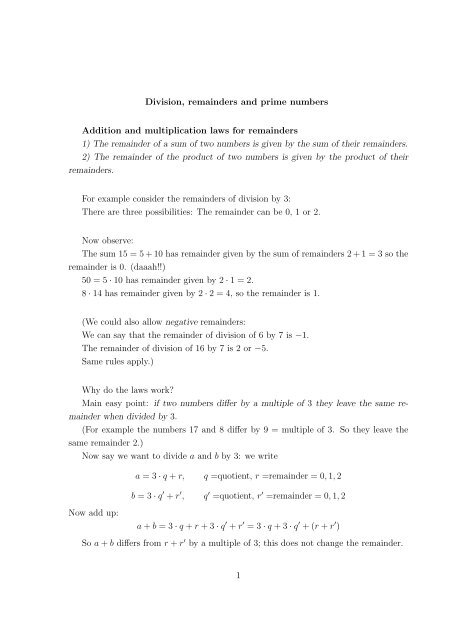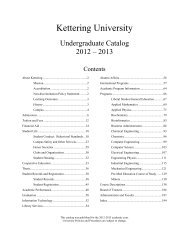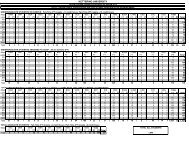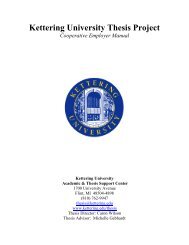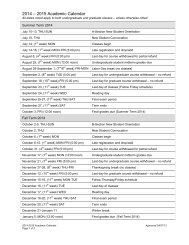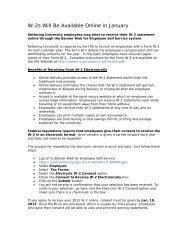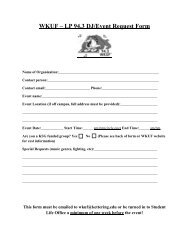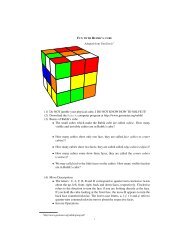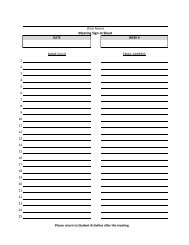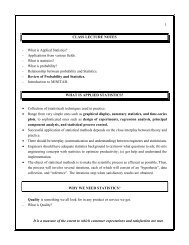Division, remainders and prime numbers Addition and multiplication ...
Division, remainders and prime numbers Addition and multiplication ...
Division, remainders and prime numbers Addition and multiplication ...
You also want an ePaper? Increase the reach of your titles
YUMPU automatically turns print PDFs into web optimized ePapers that Google loves.
<strong>Division</strong>, <strong>remainders</strong> <strong>and</strong> <strong>prime</strong> <strong>numbers</strong><br />
<strong>Addition</strong> <strong>and</strong> <strong>multiplication</strong> laws for <strong>remainders</strong><br />
1) The remainder of a sum of two <strong>numbers</strong> is given by the sum of their <strong>remainders</strong>.<br />
2) The remainder of the product of two <strong>numbers</strong> is given by the product of their<br />
<strong>remainders</strong>.<br />
For example consider the <strong>remainders</strong> of division by 3:<br />
There are three possibilities: The remainder can be 0, 1 or 2.<br />
Now observe:<br />
The sum 15 = 5 + 10 has remainder given by the sum of <strong>remainders</strong> 2 + 1 = 3 so the<br />
remainder is 0. (daaah!!)<br />
50 = 5 · 10 has remainder given by 2 · 1 = 2.<br />
8 · 14 has remainder given by 2 · 2 = 4, so the remainder is 1.<br />
(We could also allow negative <strong>remainders</strong>:<br />
We can say that the remainder of division of 6 by 7 is −1.<br />
The remainder of division of 16 by 7 is 2 or −5.<br />
Same rules apply.)<br />
Why do the laws work?<br />
Main easy point: if two <strong>numbers</strong> differ by a multiple of 3 they leave the same remainder<br />
when divided by 3.<br />
(For example the <strong>numbers</strong> 17 <strong>and</strong> 8 differ by 9 = multiple of 3. So they leave the<br />
same remainder 2.)<br />
Now say we want to divide a <strong>and</strong> b by 3: we write<br />
a = 3 · q + r, q =quotient, r =remainder = 0, 1, 2<br />
b = 3 · q ′ + r ′ , q ′ =quotient, r ′ =remainder = 0, 1, 2<br />
Now add up:<br />
a + b = 3 · q + r + 3 · q ′ + r ′ = 3 · q + 3 · q ′ + (r + r ′ )<br />
So a + b differs from r + r ′ by a multiple of 3; this does not change the remainder.<br />
1
Problem 1: What is the remainder of division of 8 2012 by 7?<br />
Problem 2: What is the remainder of division of 2 2012 by 3? how about of 2 2011 ?<br />
Problem 3: What are the <strong>remainders</strong> of division of 10, 100, 1, 000, 1, 000, 000 by 3?<br />
Problem 4: What is the remainder of division of 40, 021 by 3?<br />
(Hint: Write 40, 021 = 4 · 10, 000 + 21.)<br />
Problem 5: What is the remainder of division of 2 2012 by 7?<br />
Problem 6: What is the remainder of division of 10, 100, 1000 by 11?<br />
Problem 7: What is the remainder of division of 35, 221 by 11?<br />
Problem 8: Explain why the fourth power a 4 of any number a, when divided by 5,<br />
gives remainder only either 0 or 1. What happens with the fifth power a 5 ?<br />
2
Prime <strong>numbers</strong>: Their only factors are themselves <strong>and</strong> 1.<br />
(the number 1 is not considered a <strong>prime</strong> number)<br />
2, 3, 5, 7, 11, 13, 17, 19, 23, 29, 31, . . .<br />
(Obvious) fact: Every number larger than 1 is a product of <strong>prime</strong> <strong>numbers</strong>.<br />
Examples:<br />
168 = 2 · 2 · 2 · 3 · 7,<br />
238 = 2 · 7 · 17,<br />
1, 024 = 2 · 2 · 2 · 2 · 2 · 2 · 2 · 2 · 2 · 2 = 2 10 .<br />
Problem 1:<br />
a) Is 3 a factor of 234?<br />
b) Is 3 a factor of 45, 673? of 5, 682, 985?<br />
c) Is 11 a factor of 275, 385?<br />
Problem 2: Write the following <strong>numbers</strong> as a product of <strong>prime</strong> <strong>numbers</strong>:<br />
a) 420=<br />
b) 408=<br />
c) 2,012=<br />
d) 13506641086599522334960321627880596993888147560566702752448514385152651060<br />
48595338339402871505719094417982072821644715513736804197039641917430464965<br />
89274256239341020864383202110372958725762358509643110564073501508187510676<br />
59462920556368552947521350085287941637732853390610975054433499981115005697<br />
7236890927563=<br />
(Has 309 digits: A cash price of $100,000 was offered for finding one factor of this<br />
number!!!! Hint that does not help: this number is a product of just two <strong>prime</strong>s.)<br />
3
(FOR CHEATERS: go to http://www.alpertron.com.ar/ECM.HTM )<br />
Problem 3: Are the following <strong>numbers</strong> <strong>prime</strong> or not?<br />
a) 163<br />
b) 247<br />
c) 11,111,111<br />
d) 691<br />
Problem 4: Let’s say x is a number between 1, 000 <strong>and</strong> 2, 000. We check that x is not<br />
divisible by any <strong>prime</strong> number between 2 <strong>and</strong> 43 (these two included). Is the number x<br />
<strong>prime</strong>?<br />
Problem 5: Consider the number (2 · 3 · 5 · 7 · 11 · 13 · 17 · 19) + 1 = 9, 699, 691.<br />
Is it divisible by a number between 2 <strong>and</strong> 20?<br />
Problem 6: Find two <strong>numbers</strong> a <strong>and</strong> b (could be negative) such that<br />
1 = 13 · a + 17 · b.<br />
Problem 7: The same problem as above but for any two different <strong>prime</strong>s p <strong>and</strong> q<br />
instead of 13 <strong>and</strong> 17. Is there a method that always work to find a <strong>and</strong> b such that<br />
1 = p · a + q · b ?<br />
4
How many <strong>prime</strong>s are there?<br />
2, 3, 5, 7, 11, 13, 17, 19, 23, 29, 31, 37, 41, . . . . . .<br />
Suppose that the list ends <strong>and</strong> that there is a largest <strong>prime</strong>=godzillion, blaa, ......<br />
I can then take the product of all the <strong>prime</strong>s in the list<br />
2 · 3 · 5 · 7 · 11 · · · · · · (largest <strong>prime</strong>)<br />
<strong>and</strong> I add one to it:<br />
2 · 3 · 5 · 7 · 11 · · · · · · (largest <strong>prime</strong>) + 1.<br />
This (huge) number is not divisible by 2, 3, . . .. It is not divisible by any <strong>prime</strong> in<br />
our list so far. It has, however, a <strong>prime</strong> factor for sure. This <strong>prime</strong> factor is a <strong>prime</strong><br />
number which is bigger than all the <strong>prime</strong> <strong>numbers</strong> in our list.<br />
So the list never ends; the list of <strong>prime</strong>s is infinite!!<br />
Question 1: What is the largest <strong>prime</strong> which is known today?<br />
Answer: 2 43,112,609 − 1 (has more than 10 million digits)<br />
Question 2: What is the “probability” that a number is <strong>prime</strong>?<br />
how many <strong>prime</strong>s are less than 10= 4, 40%<br />
how many <strong>prime</strong>s are less than 100=25, 25%<br />
how many <strong>prime</strong>s are less than 1,000=168, 16,8%<br />
how many <strong>prime</strong>s are less than 10,000=1,229, 12,3%<br />
how many <strong>prime</strong>s are less than 100,000=9,592, 9,6%<br />
how many <strong>prime</strong>s are less than 1,000,000=78,498, 7,85%<br />
Answer: Roughly decreases proportionally to the number of digits we allow the<br />
number to have.<br />
Question 3: Is every even number (except 2) a sum of two <strong>prime</strong>s?<br />
(we are allowed to use the same <strong>prime</strong> twice, for example: 6 = 3 + 3.)<br />
4 = 2 + 2, 6 = 3 + 3, 8 = 3 + 5<br />
10 = 7 + 3 = 5 + 5, 12 = , 14 = , 16 = ,<br />
18 = , 20 = , 22 = , 24 = , 100 =<br />
Question 4: 3 <strong>and</strong> 5 are twin <strong>prime</strong>s (they are as close as possible), same for 5 <strong>and</strong><br />
7, 11 <strong>and</strong> 13, <strong>and</strong> also 29 <strong>and</strong> 31. Is the list of such pairs of twin <strong>prime</strong>s infinite?<br />
5


